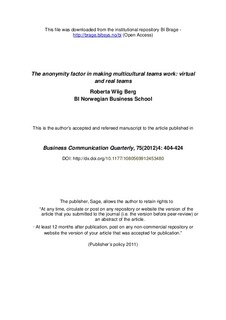| dc.contributor.author | Berg, Roberta Wiig | |
| dc.date.accessioned | 2013-02-11T14:31:39Z | |
| dc.date.available | 2013-09-01T23:00:20Z | |
| dc.date.issued | 2012 | |
| dc.identifier.issn | 1552-4191 | |
| dc.identifier.uri | http://hdl.handle.net/11250/93740 | |
| dc.description | This is the author’s accepted and refereed manuscript to the article | no_NO |
| dc.description.abstract | A major purpose of courses in intercultural communication is often to improve students’ ability to perform well in situations with the potential to be both highly enlightening and highly difficult—in multicultural teams. This article reports the results of exercises in which members of a dysfunctional multicultural class were assigned to teams and given a task to perform in an anonymous, virtual-team setting, as well as in a real-team setting. Team members contributed in a much more balanced manner in the anonymous virtual-team exercise. However, team members nevertheless believed their input had been heard and appreciated in the real-team setting. | no_NO |
| dc.language.iso | eng | no_NO |
| dc.publisher | Sage | no_NO |
| dc.subject | multicultural teams | no_NO |
| dc.subject | virtual teams | no_NO |
| dc.subject | anonymity | no_NO |
| dc.subject | intercultural communication | no_NO |
| dc.title | The anonymity factor in making multicultural teams work: virtual and real teams | no_NO |
| dc.type | Journal article | no_NO |
| dc.type | Peer reviewed | no_NO |
| dc.source.pagenumber | 404-424 | no_NO |
| dc.source.volume | 75 | no_NO |
| dc.source.journal | Business Communication Quarterly | no_NO |
| dc.source.issue | 4 | no_NO |
| dc.identifier.doi | 10.1177/1080569912453480 | |
